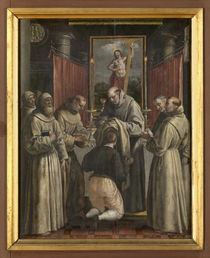The Catholic Defender: Saint Bernard of Clairvaux
- Donald Hartley

- Aug 19
- 3 min read
Updated: Aug 21
Deepertruth with special permission and aid with Franiciscan Media, a great team for the Lord

As the founder and abbot of the Abbey of Clairvaux, St. Bernard (1091-1153) was centrally responsible for the early expansion of the Cistercian Order throughout Europe. Tens of thousands heard his powerful preaching, and he personally attracted and helped many hundreds of men to follow a call to monastic life.
St. Bernard had a reputation for being very intelligent and very holy. His spiritual writing appealed to many, and his most popular work is Apologia. He even was consulted by popes and monarchs. At the time of his death in 1153 there were some 400 Cistercian monasteries in Europe, 163 of which he founded.
Bernard was appointed Abbot at Clairvaux.He was a powerful preacher and is reported to have performed miracles, especially in healing the sick. His reputation attracted great crowds of pilgrims to Clairvaux which soon became the most important of the Cistercian monasteries.
Healings and miracles began to be ascribed to him, including the restoration of the power of speech to a converted nobleman who was dying so that he could properly confess his sins. Bernard was sought after for his wisdom—princes and popes asked for his counsel in their affairs, and he struggled to meet the needs of
For St. Bernard, the greatness of Mary was rooted in her exalted status as the Mother of the Incarnate Word. He once said that if we realize whose Mother she is, we would understand that we “cannot admire her enough”
Bernard is a boy's name with French and German origins meaning “strong” or “brave bear.” Brave bear is particularly fitting considering that this name was given to the loveable dog breed, the St. Bernard.
It is said that the iconic wooden barrel hung with a leather strap around San Bernard´s neck contained Brandy and this served to provide warmth to travelers who were crossing through the snow and gave time for humans to arrive at their destination, normally the dogs were the first to approach.
For Bernard, life was a radical experience with the love of God; his was a life of fraternity, asceticism, and a daily encounter with the humanity of Christ. Love for Christ, he said, is the first step to genuine prayer.
Man of the century! Woman of the century! You see such terms applied to so many today—“golfer of the century,” “composer of the century,” “right tackle of the century”—that the line no longer has any punch. But Western Europe’s “man of the twelfth century,” without doubt or controversy, had to be Bernard of Clairvaux. Adviser of popes, preacher of the Second Crusade, defender of the faith, healer of a schism, reformer of a monastic Order, Scripture scholar, theologian, and eloquent preacher: any one of these titles would distinguish an ordinary man. Yet Bernard was all of these—and he still retained a burning desire to return to the hidden monastic life of his younger days.
In the year 1111, at the age of 20, Bernard left his home to join the monastic community of Citeaux. His five brothers, two uncles, and some 30 young friends followed him into the monastery. Within four years, a dying community had recovered enough vitality to establish a new house in the nearby valley of Wormwoods, with Bernard as abbot. The zealous young man was quite demanding, though more on himself than others. A slight breakdown of health taught him to be more patient and understanding. The valley was soon renamed Clairvaux, the valley of light.
His ability as arbitrator and counselor became widely known. More and more he was lured away from the monastery to settle long-standing disputes. On several of these occasions, he apparently stepped on some sensitive toes in Rome. Bernard was completely dedicated to the primacy of the Roman See. But to a letter of warning from Rome, he replied that the good fathers in Rome had enough to do to keep the Church in one piece. If any matters arose that warranted their interest, he would be the first to let them know.
Shortly thereafter it was Bernard who intervened in a full-blown schism and settled it in favor of the Roman pontiff against the antipope.
The Holy See prevailed on Bernard to preach the Second Crusade throughout Europe. His eloquence was so overwhelming that a great army was assembled and the success of the crusade seemed assured. The ideals of the men and their leaders, however, were not those of Abbot Bernard, and the project ended as a complete military and moral disaster.
Bernard felt responsible in some way for the degenerative effects of the crusade. This heavy burden possibly hastened his death, which came August 20, 1153.





















Comments